IN A STRANGE TOWN.
Chapter 6. October 17 2021. Text by SC. # Comments
Sitting shotgun, I felt like an active participant in our drive to find the Wodaabe deep in the Sahelian bush. As our Landcruiser dipped, dove, and ripped through bushes, over an uneven dirt path made by and for cattle and people, I was frequently working the electric window button. Up when the acacia thorns would scrape against the car and risk slapping us in the face. Down the second we were in the clear, because the heat in the car immediately became unbearable without the air flow.
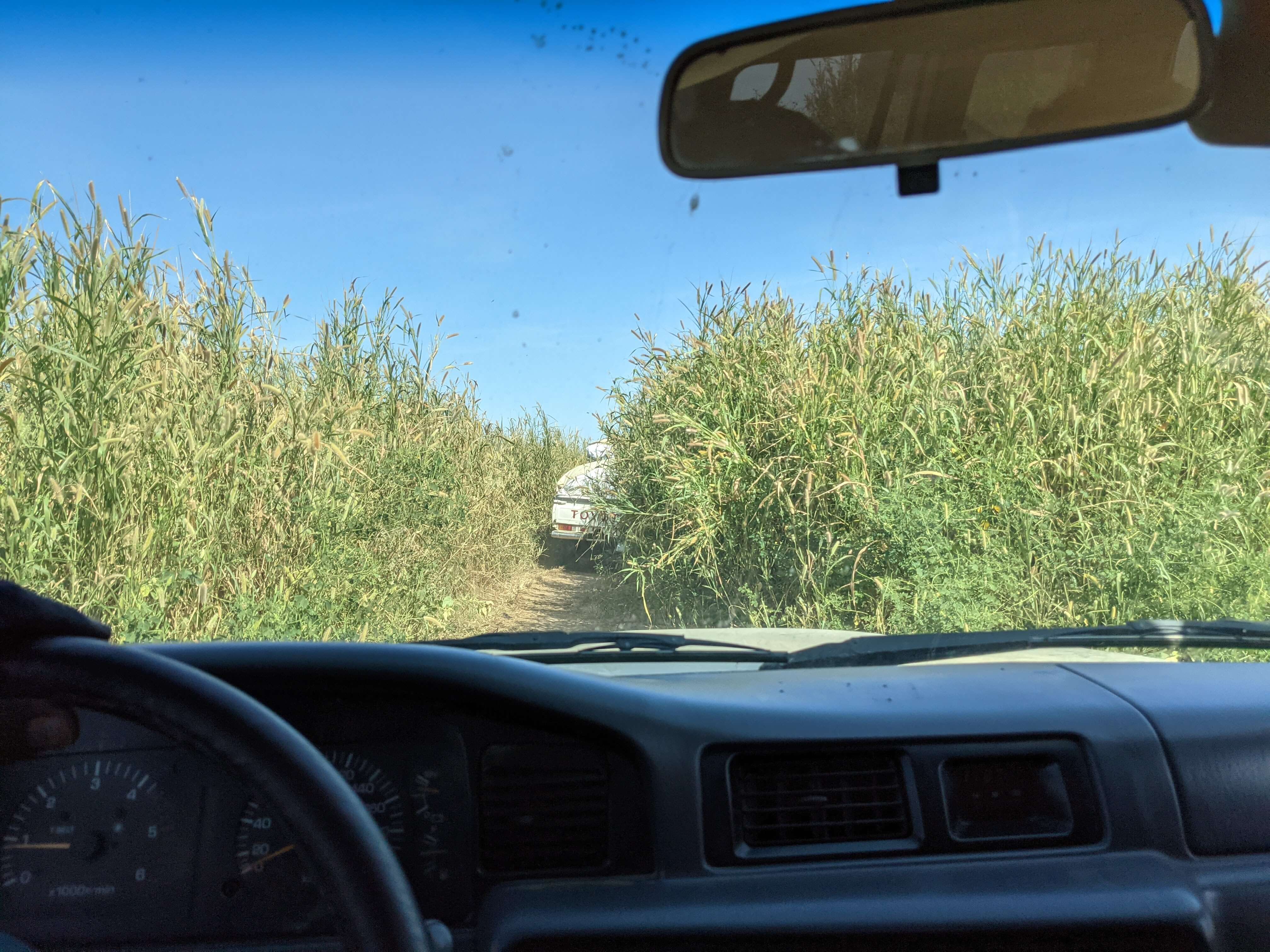
It was our second day looking for the Wodaabe, nomadic herders whose colourful festival had brought us out to Chad. Tarmac ended 25 kilometers outside of N’Djamena, the capital. Dirt roads, at best, continued for 100 kilometers or so, full of holes and bumps that required frequent swerving. We occasionally passed small villages of traditional mud houses, from which children raced to the side of the road to enthusiastically wave hello to the passing vehicles full of foreigners. We’d set up camp early in the evening the day before, unable to find the Wodaabes before the sun went down. But as we drove deeper into the Sahel along ever rougher terrain, it felt like we must be close. Suddenly we emerged from the shrubs into a clearing: a long corridor of beaten down earth with shrubs on either side, cows roaming, and small clusters of people every few hundred meters. This pasture was the temporary home to the Wodaabe and our home for the next five days.
To find a new mate or maybe just a lover
The Wodaabe are nomadic pastoralists who herd cattle, sometimes walking up to 40 kilometers a day. Year after year, they embark on a giant circuit through Chad’s Sahelien belt to find for their cows what rare grass and water the challenging climate has to offer. The circuit pauses for about a week at the end of the rainy season, a time when there is enough grass in one place to allow for several families from two Wodaabe clans to meet and stay together for a few days. This is when the Gerewol happens: a festival where young men dress in the most colourful outfits and accessories, paint their faces, dance and chant with the goal of being chosen by a young woman from the other clan.Both the young women and the young men who participate in the festival are already married. A first marriage is arranged within their clan when they are young by their parents for everyone, to ensure that they all at least have a spouse. So the Gerewol is the opportunity for you to choose a spouse, one based on attraction. For the men, it is the chance to have a second or third or even fourth (the maximum under Islam, nominally though very loosely followed by Wodaabe) wife. For the women, who can only have one husband, it is the chance to find a new partner if they don’t like the first one. For everyone, both the married and unmarried, the festival can also simply be the opportunity to have a very short term romantic relationship. Apparently the bushes are, ahem, busy during the festival. There is no judgment when it comes to pre-marital sex. Should the young woman get knocked up in the process? No problem! It simply demonstrates that both partners are able to have children, the most important part of a marriage.


For the couples that do end up getting married, there is one final hurdle: the man must kidnap the woman from her first husband. This is a real kidnapping (albeit with a willing “victim”), as the first husband is generally unhappy and unwilling to lose his wife. So her new match needs to find a way to take her away so that she can divorce her previous husband (which is a totally accepted practice) and marry the new guy. Our guide, the tremendous Elena Dak, helped us understand all the intricacies of these rituals, since the Wodaabe speak neither French nor Arabic, the two official languages in Chad. An Italian anthropologist who has worked with the Wodaabe for many years, living with one clan for six weeks and crossing the Sahara with a related people's salt caravan. She explained that interclan marriages play an important role in creating links between these nomadic people, who otherwise are marginalized in Tchadienne society. Even if there is an inherent tension between upsetting an individual (the spurned first husband), the ritual is important for the sake of connection between the communities.
Beauty as a value
After setting up camp, we were very eager to meet the young Wodaabe who would be participating in the festival, and we heard we were about to get our first opportunity. A group of young men were shading themselves from the late afternoon sun under an acacia tree, painting their faces bright orange with ochre powder they had transformed into makeup. Their bodies were already decorated with strings of brightly colored whistles, beaded necklaces, small mirrors, bracelets, anklets, and other hand-made accessories that would jingle and flash as they danced. Once their faces were painted orange, their eyes circled in eyeliner, and their lips painted blue or black, they adorned their heads with a type of turban, sometimes white, sometimes colourful, with a truffula tree of a pompon in the front and topped with a geyser made of goat-neck hair. It is definitely a look that will get you noticed.

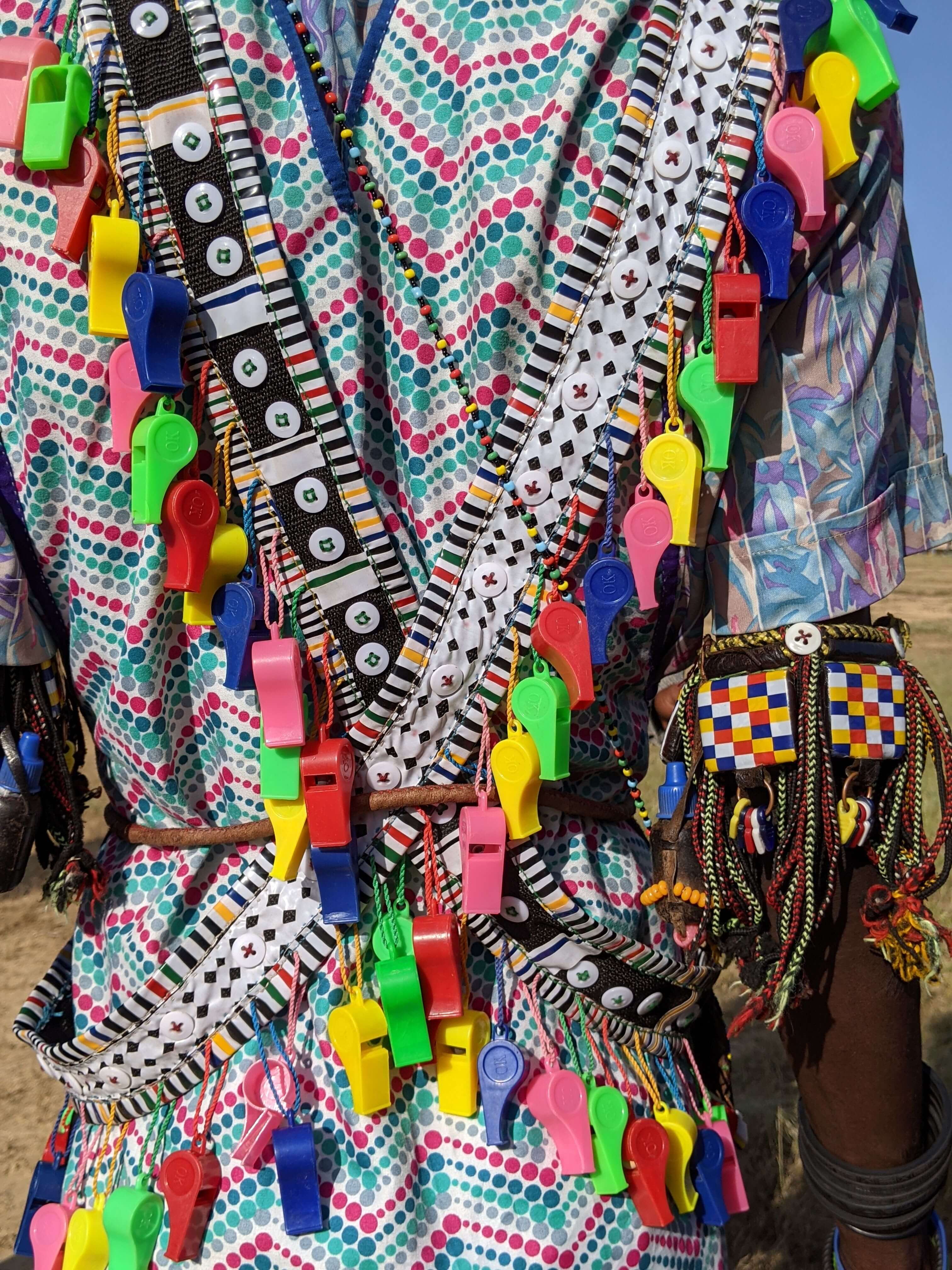
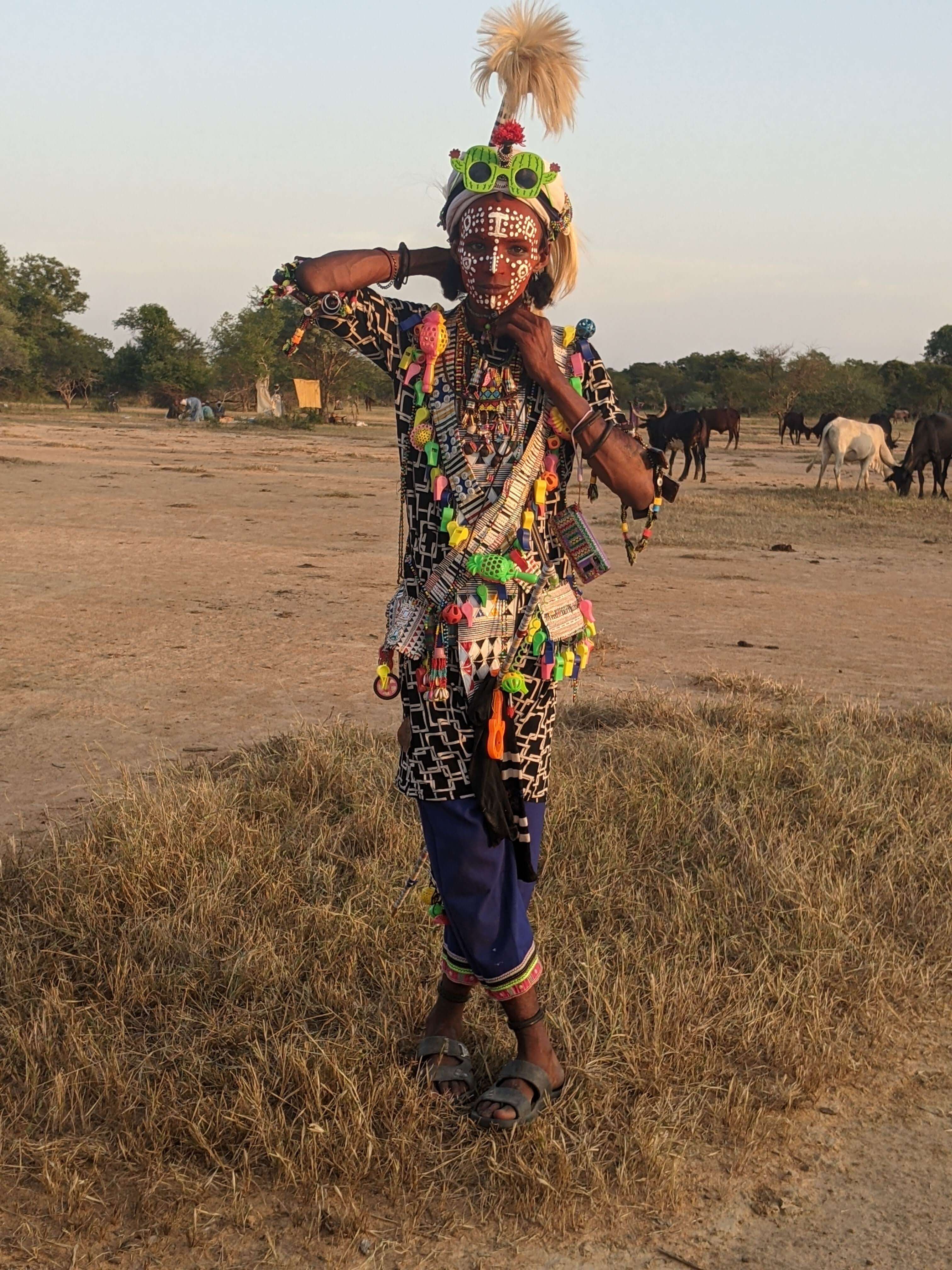
The Wodaabe hold beauty as their highest value. They have come to believe that they are the most beautiful men; beauty that is enhanced with their adornments. Indeed, once ready, the young men repeatedly insisted that we photograph them, if we weren’t already. Their ultimate symbol of beauty is the white heron. How they hold themselves, how they walk, seeks to replicate the grace of the heron and its beauty. And as they started to dance, they were, there too, imitating the heron. There were two main dances, one that involved forming a circle and turning slowly, one step forward, one step sideways, while chanting. The second dance involved forming a straight line and then in turns, coming forward in small groups of two to four, shaking their chests, thrusting out their faces, widening their eyes, and chattering their teeth. All of this was to demonstrate the extreme control they had over the different parts of their body, according to Elena Dak. And the teeth chattering also serves to imitate the heron? Probably? Sometimes these details can be hard to confirm.
Moments of drama
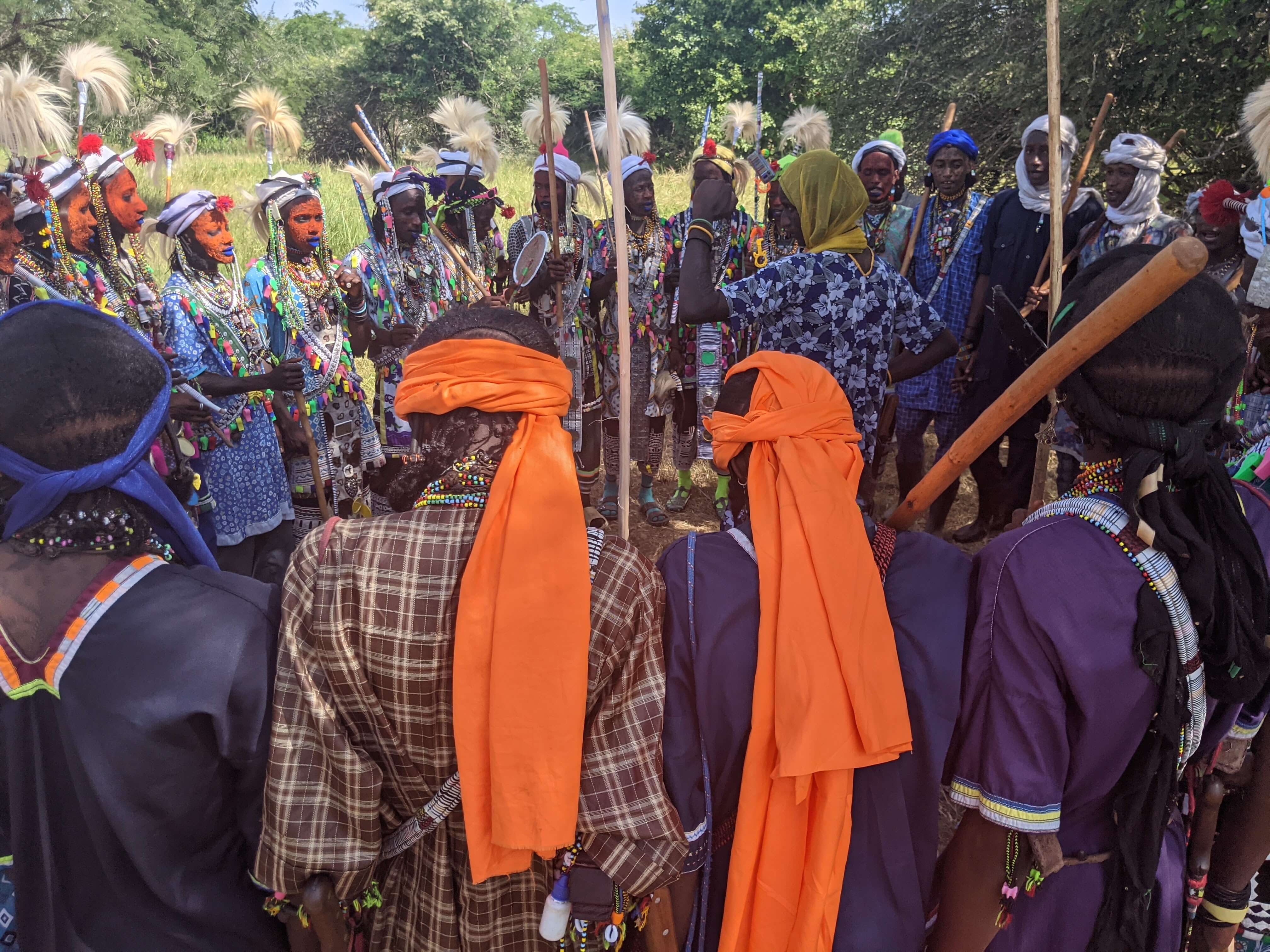
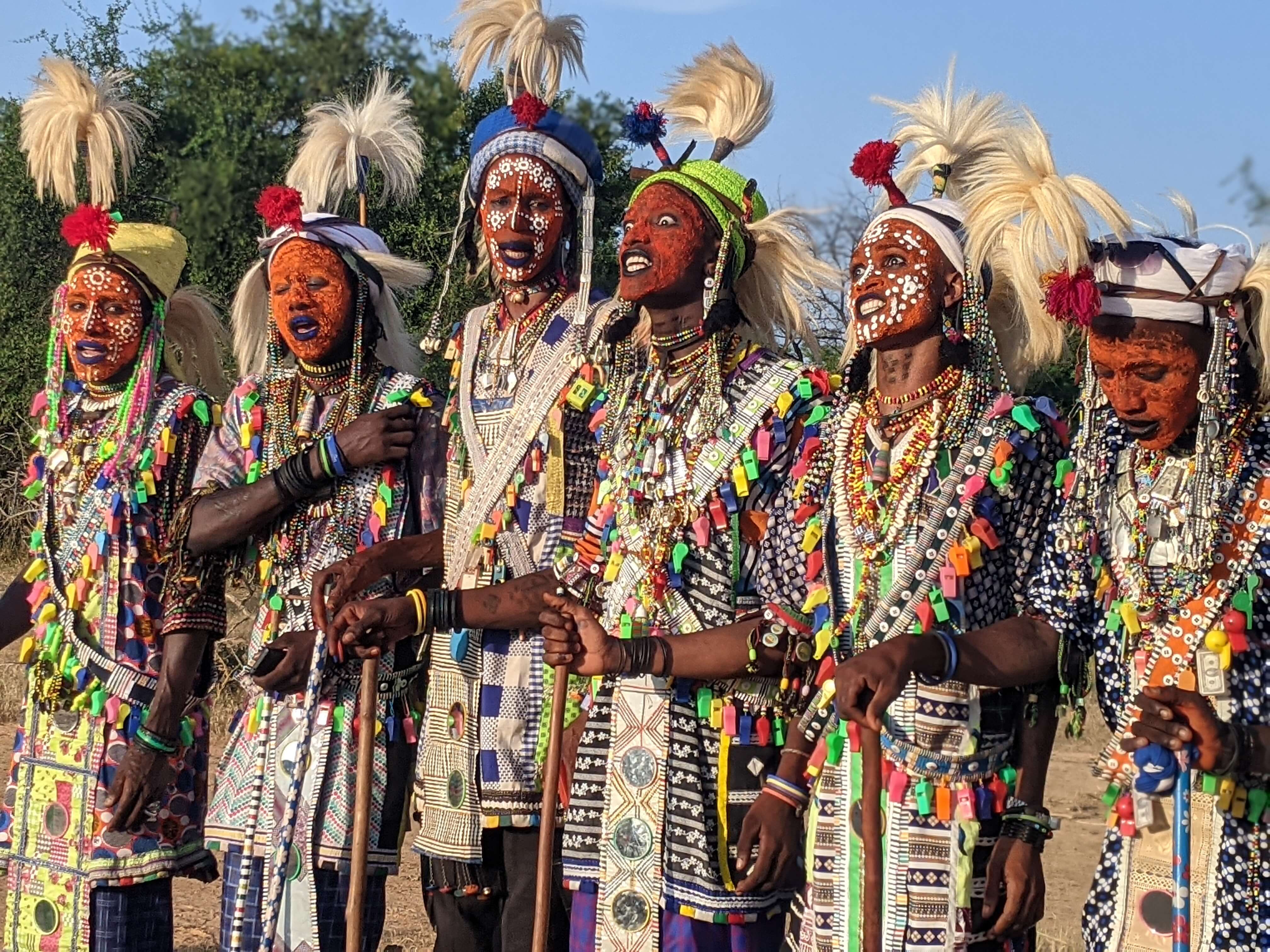
The term Gerewol is used in the tourism world to describe the entire festival, when in fact it describes a particular part of the festival: when the young women, two at a time, choose their man. This happened a number of times throughout the festival. The timing was unpredictable but when it was about to happen, there was a clear shift in the mood and energy, signaling that something was coming. The young men would have their dancing line straightened out by one of the older community members, the chief was present, the crowd packed in tightly in front of the line of dancers pushing forward with anticipation. Then two young women, with veils thrown over their heads, would materialise in front of the line of young men. Sometimes they would stare for several minutes, as if they were still finalizing their decision. This, we were told, was part of the theater of the festival - their decision was very certainly made. In fact, in some cases, the woman “choosing” in front of everyone was a proxy for the real woman who was making her choice and staying hidden in the crowd.
Then, very slowly, one of them would break forward, shyly walk up to the young men and barely tap the chosen one on the chest before quickly turning around, pulling the veil over her face and walking back. The second young woman would do the same and then the crowd would dissipate. That was it! What came next, whether the young man was also interested, whether it led to a tryst or marriage (preceded by a kidnapping), we didn’t get to know. For a very public display, a lot actually happened out of sight.
There were several more Gerewols, including late one evening, the makeup and costumes even more striking at nighttime. The plot thickened as the young man who was chosen in the first round, was chosen once again. Clearly this guy was a hot commodity! What would he do? Choose one? Take two new wives? Simply sleep with one or both of them? These were all options for him.
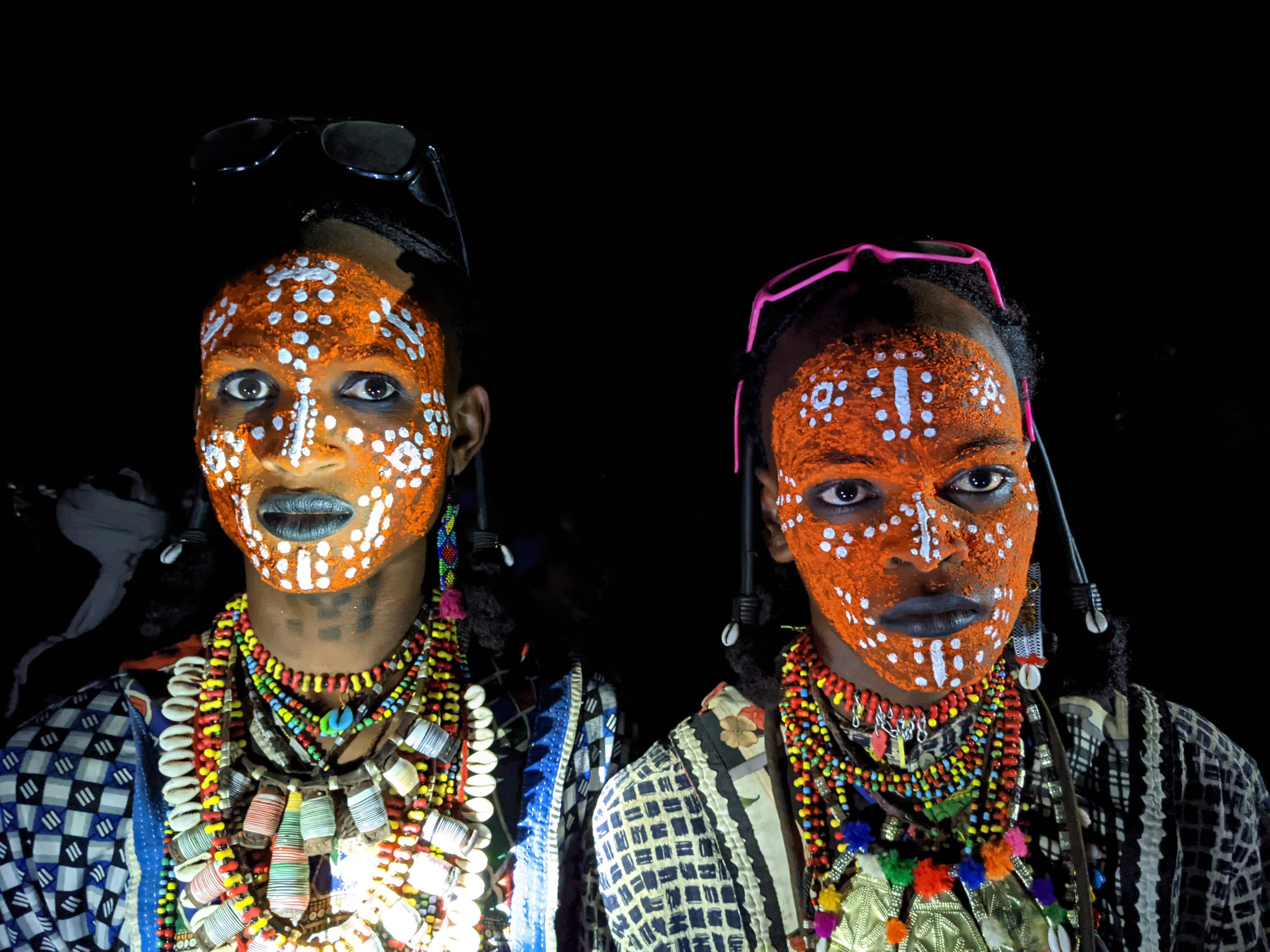
Another surprise came in a more private moment. The next day, our guide Elena came up to me to say that one of the young men had expressed interest in me.
“He told me that he would like his second wife to be a white woman. When I asked how I could be of assistance, he pointed out that there were many white people with me in the group. I asked if any in particular interested him, and he pointed at you.”
While my life has taken a turn towards the nomadic in the last few months, becoming a nomadic herder’s wife seems to be taking it a step too far.
But the young man was serious. Later in the day during some downtime, Elena and I were talking off to one side at our campsite when he came by to say hello to her. He left after a minute or two. “I think he was really here to say hello to you,” Elena said. And sure enough, a few minutes later he circled back and sat down near us. Was I interested in marrying him, he wanted to know. I replied that I was married. He shrugged: not a problem. Happily married, I clarified. Reticently he left after seeing no progress would be made on the question.
That still wasn’t the end of it. Later that day, when we headed back to the festival, he approached Elena again to ask for my answer to his proposal. I reiterated that I was married but that continued to be an insufficient answer. So I clearly said “No” but added that I was honoured. Elena just relayed the no, not wanting to complicate matters. I joked with Kevin to keep an eye out so that I wouldn’t get kidnapped that night.
Now you might be thinking, as I did, aren’t the women supposed to be the ones who choose? Well, like in any society, there are the rules and then there are humans who selectively apply the rules.
The final night of the festival, we were told that the young men would dance through the night. So it wasn’t a surprise when I stirred at 5 am and heard the melodic chanting still going in the distance. Then I heard Damien, one of the members of our group, announce that something “amazing” was happening. I rolled out of the tent and sleepily headed towards the chanting. The first thing I saw were the young men we’d been seeing for the last four days, barely standing from exhaustion, but still going. Then I noticed about twenty feet away, another group. As I approached, I discovered that this was a completely different Wodaabe clan. The great meetup that was supposed to happen at the beginning of the festival had been delayed because one of the men from the other group had ‘kidnapped” a woman from this group in the incorrect way, angering the woman’s first husband and causing great offense. But conversations had happened in the background, the kidnapper kept his distance, and the rest of the clan was allowed to come forward at this late hour. And so, we had the great privilege to discover another group, their songs, their dress, their chants all very distinct, as well as witnessing the coming together of two groups.
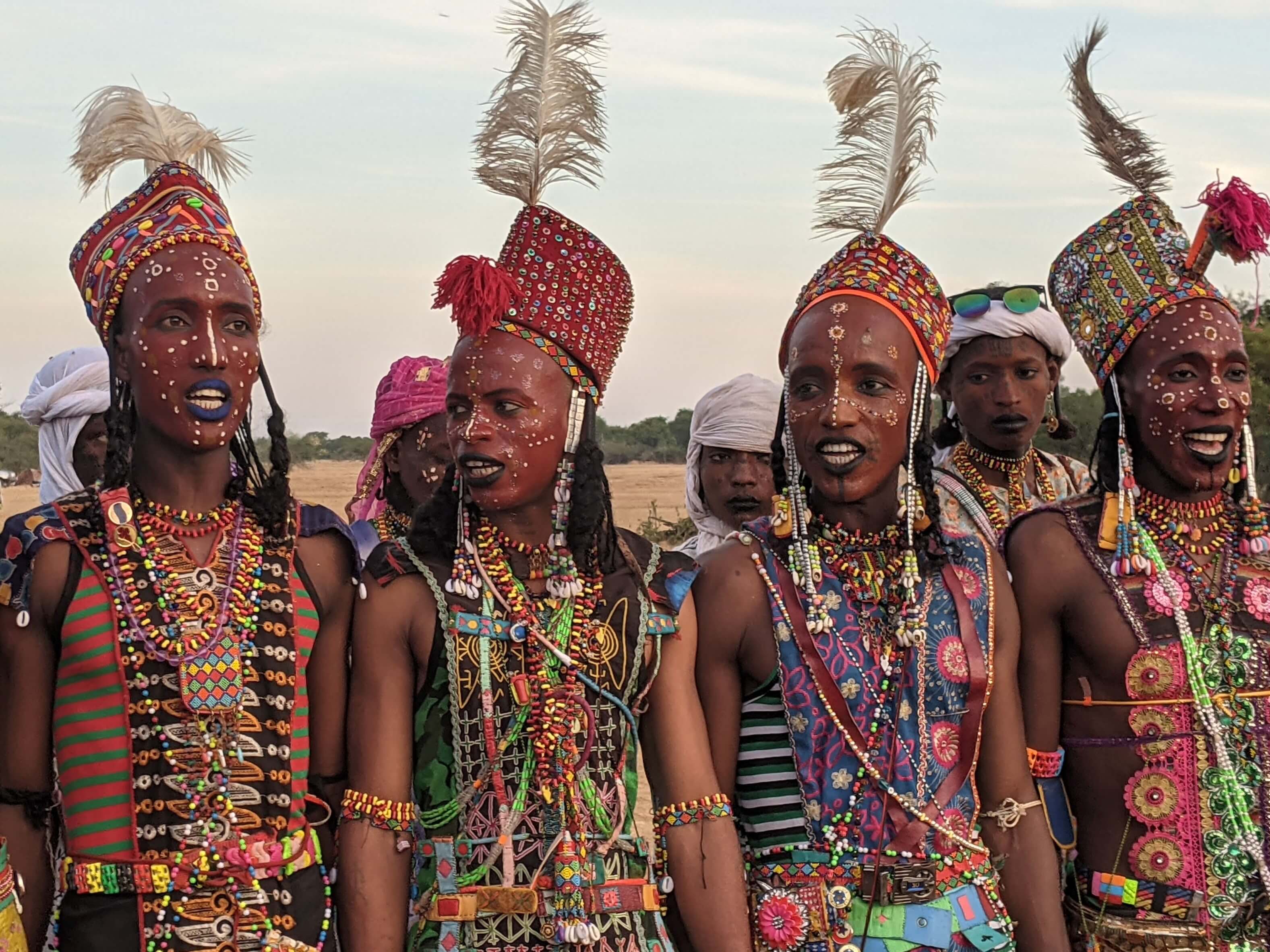
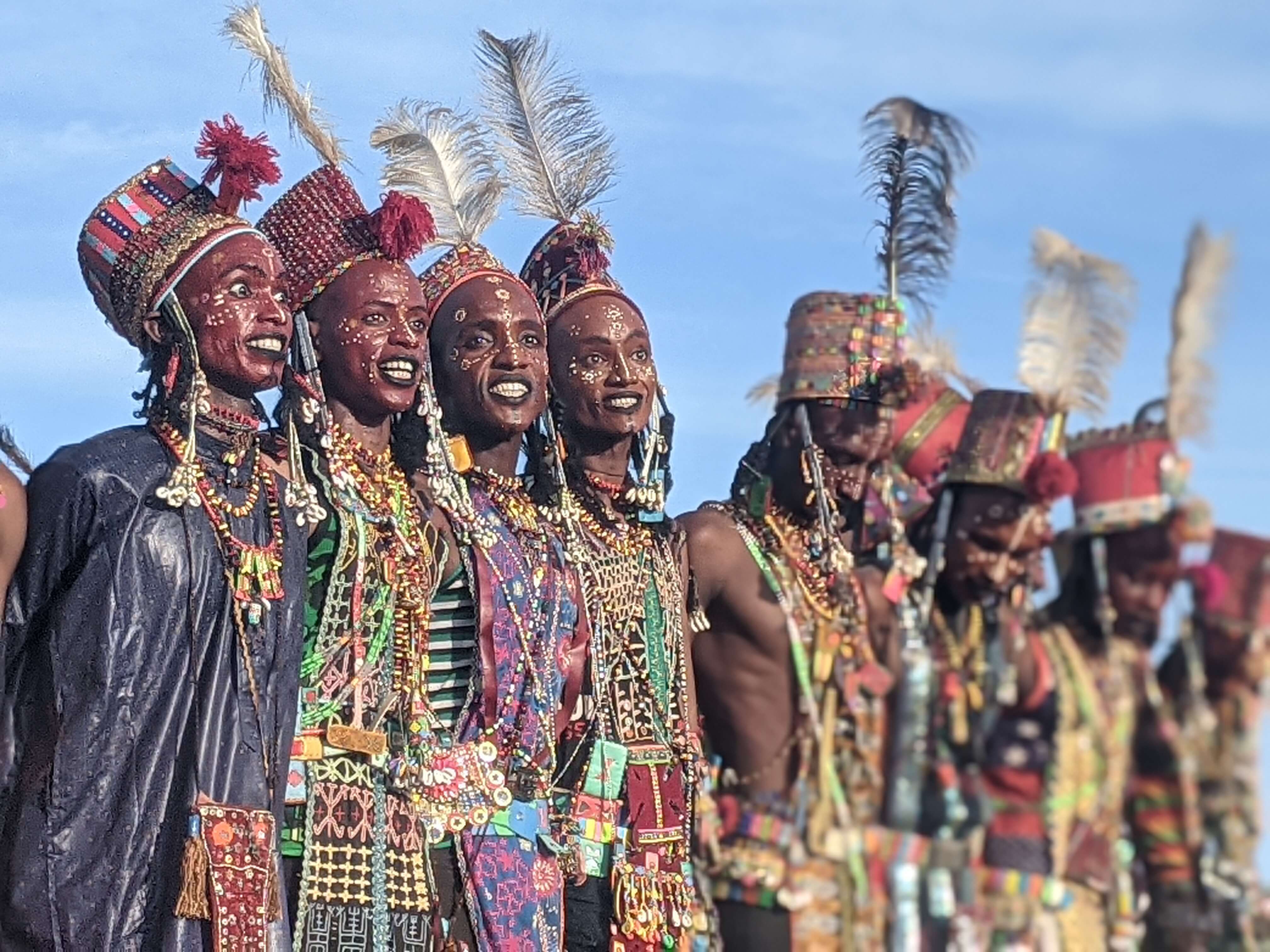
A couple of hours later, there was another Gerewol, with young women from both sides making their choice. A final plot twist: the young man who had been chosen twice already was chosen a third time by a young woman from the other group. His prestige among the Wodaabe had reached great heights for the year ahead and he had many options in front of him!
Shared curiosity and interest
It goes without saying that the entire festival, as well as the daily life of the Wodaabe was a source of deep fascination for us foreigners. What I was most surprised to discover was the extent to which this interest was shared by many and in all directions. When the Wodaabe were performing, people from the neighbouring sedentary communities also came to watch, most of them walking many kilometers each way for the privilege. Everyone was taking pictures, including the Wodaabe themselves, who were capturing the memories that would sustain them through the next solitary year of herding.

We too, were a source of fascination. During the downtime, usually from late morning to late afternoon, when the sun and heat were too intense to dance, our group would sit in the shade and read or nap. A constant flow of visitors would come by: kids, men and women, young and old. Some would stand at a short distance and merely observe us, some would start with Elena, whom they knew, and then approach the rest of us more gradually, some (mostly the kids) came right up to us for a close examination. I had a group of young women pore over me, touching my hair, elastic and bobby pin with great interest, parting my hair to get a close look at my scalp, touching my arms to feel my skin. Elena told me that they think we are strange, chameleon-like humans, since we turn red in the sun. In terms of beauty, they also find our light eyes quite distasteful.

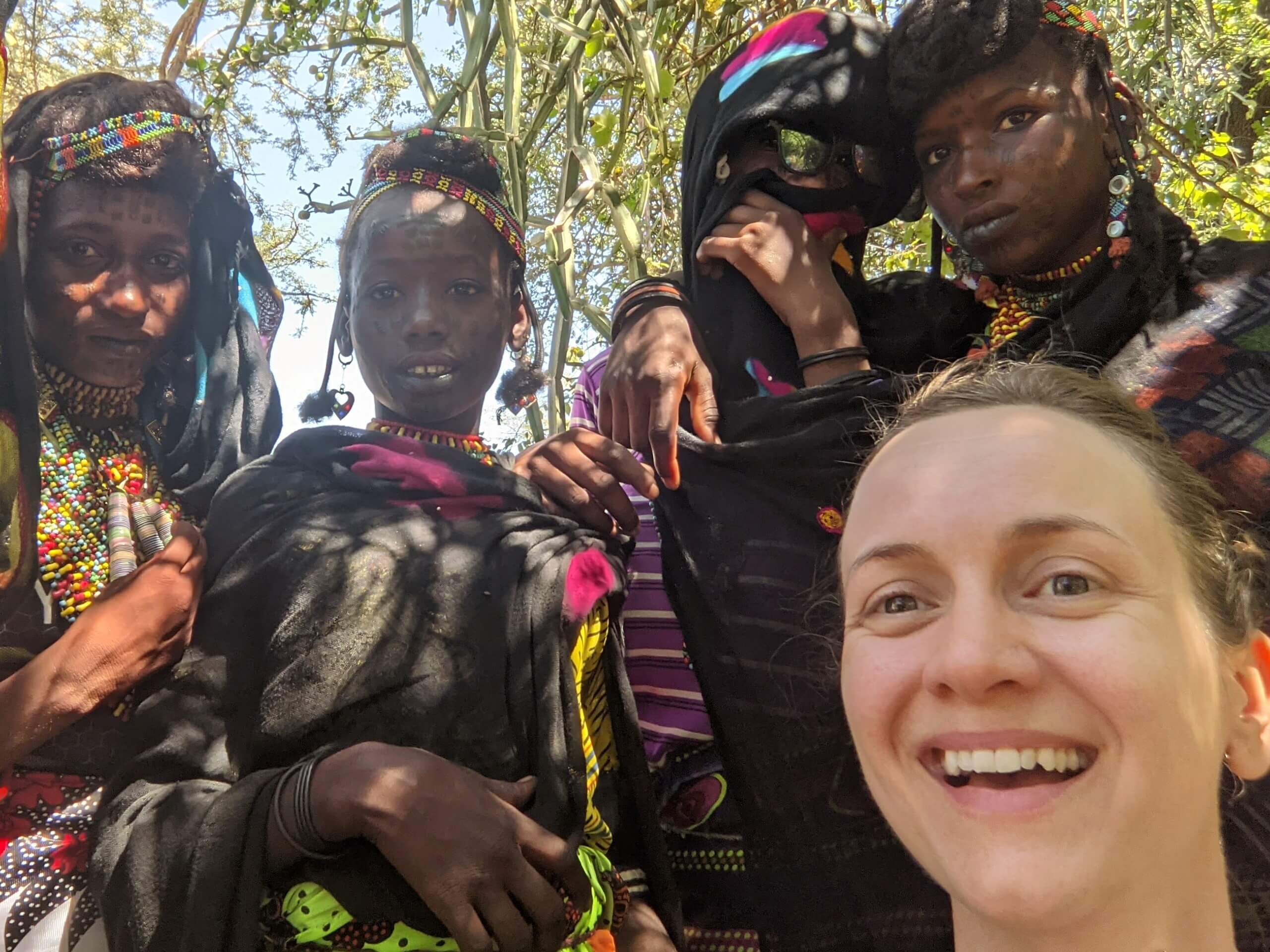
Two young boys took over the book I was reading and with rapt attention, turned every single page one by one, not looking at the text but simply fascinated by the pages. (None of the Wodaabe read or write, so the book was a very foreign object to them.) The interest of course continued when we were at the festival, with people talking to us, taking pictures, sometimes surreptitiously, sometimes directly, kids asking to try on our sunglasses, wanting to see our pictures, and trying to take pictures themselves using our cameras.
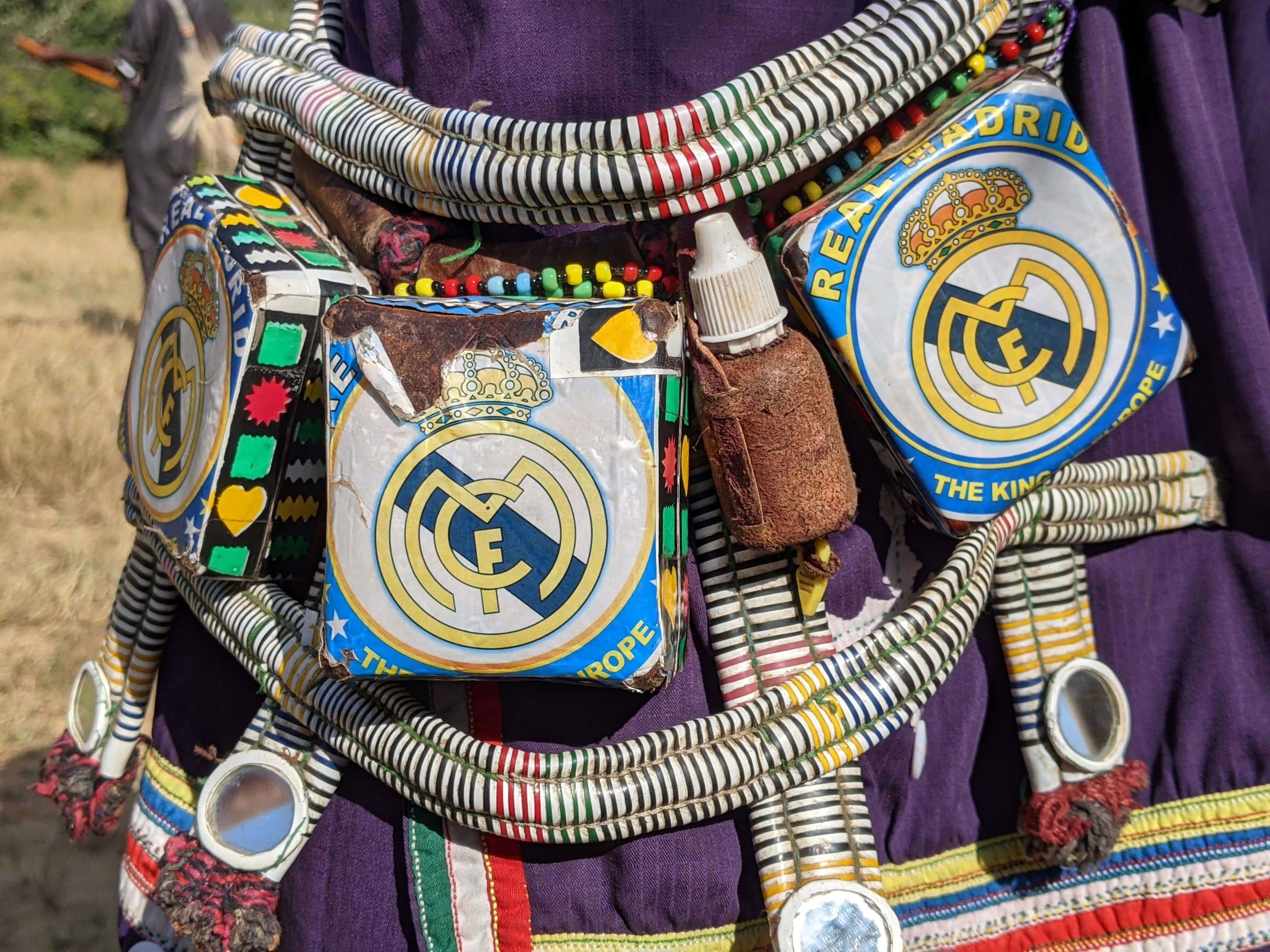
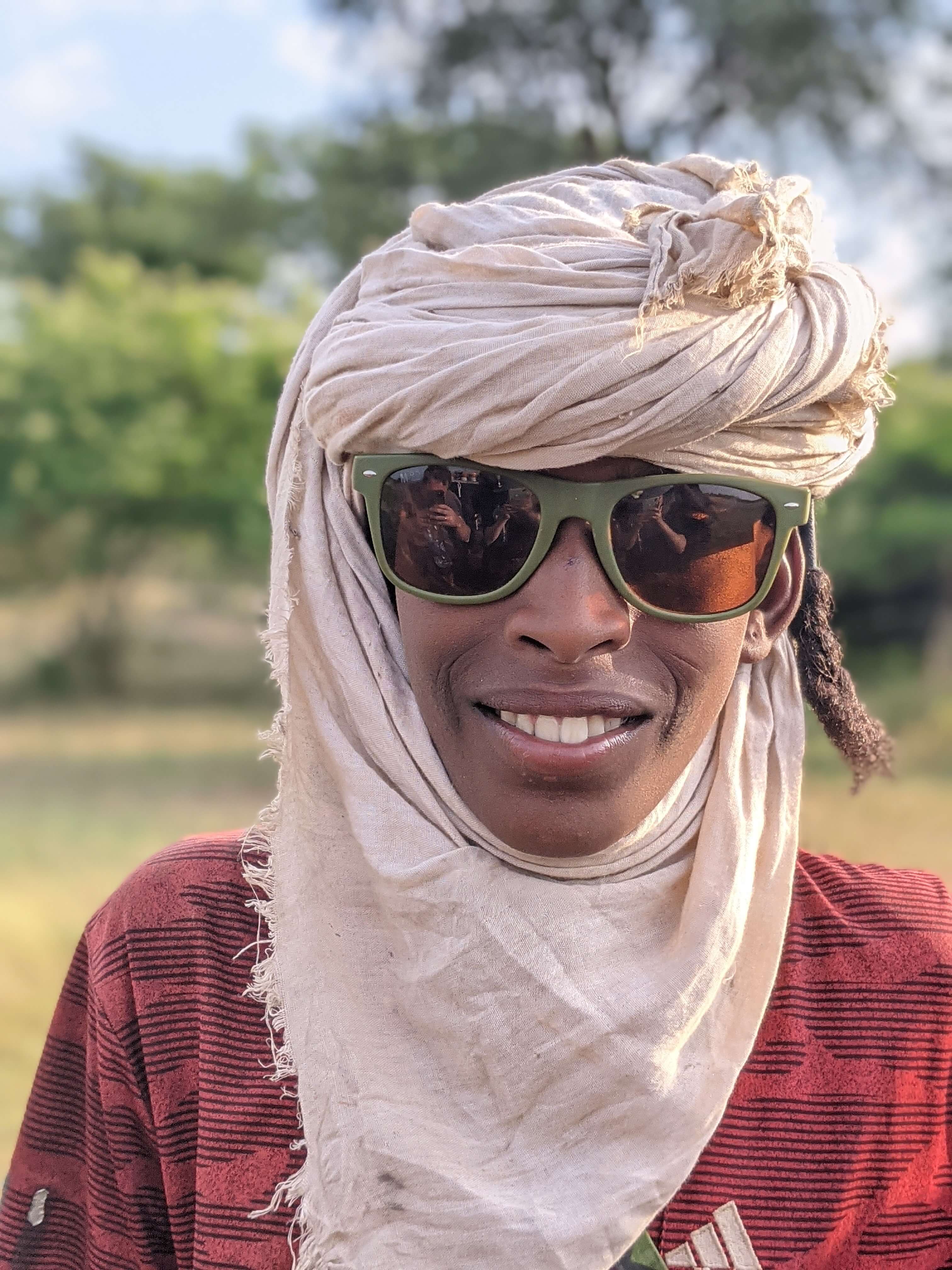

This curiosity for the new and the different is reflected in the Wodaabe dress, with the integration of modern items they find at the market or sometimes even garbage. Young women often wore jerseys of famous football players and the young men’s accessories featured stickers with the Real Madrid team logo. In both cases this had nothing to do with football fandom, because they have no idea who these players or teams are, but rather an appreciation for the beauty and colour of the items. Old bottles of eye drops and plastic SD card cases were up-cycled into accessories. Most amusing of all was the young Wodaabe man who arrived in the second group on the last day, sporting a tank top of Stars and Stripes which revealed the face of a recent former President when his accessories were pulled to one side. He had no idea who Trump was, he just thought it was a cool tank top with bright colors.
It was an amazing experience; a truly unique privilege to participate in an authentic festival that at most a few foreigners get to see every year. I am grateful and awed that a people who are usually so isolated and marginalized would show themselves so welcoming and open to us. Their hospitality, images, and song will stay in my mind for a long time to come.
Text by SC
Near Massenya, Chad
October 17 2021
Tweet
Practical Details - Chad
Hotels
In the capital, there are few good choices. Hotel Irrisor is the old Ibis, in a secure compound next to a sister hotel, La Tchadienne, with a pool [$180]. The only major chain remaining is the Radisson Blu. La Residence was previously the Hilton, and is right next to the airport. Outside the capital, we camped each night.
Food
Grilled kebabs can be found throughout the country. There is one Western-style cafe, L'Amandine [$10], and one Lebanese restaurant in N'Djamena. The food at La Tchadienne is mediocre, overpriced, and served on a patio absolutely covered with huge insects.
Transport
Travel outside the capital is very challenging without a tour, both due to bureaucracy and expense. We went with Native Eye/SVS, the latter having decades of experience in Chad and connections at the highest levels. Without personal connections to a Woodabe sultan, it is impossible to find a Gerewol: they are not intended for tourists and tend to be held in very remote areas with little advance notice.